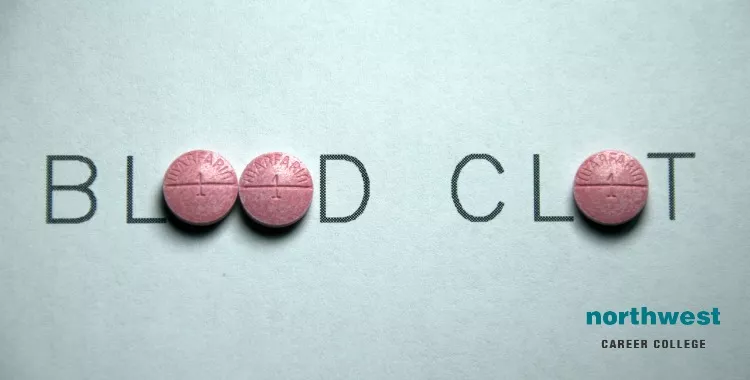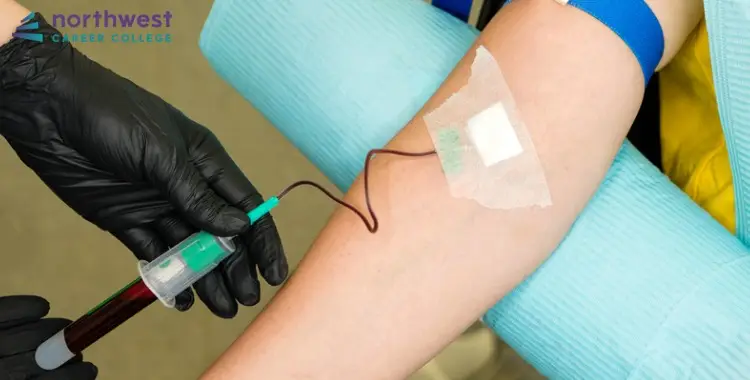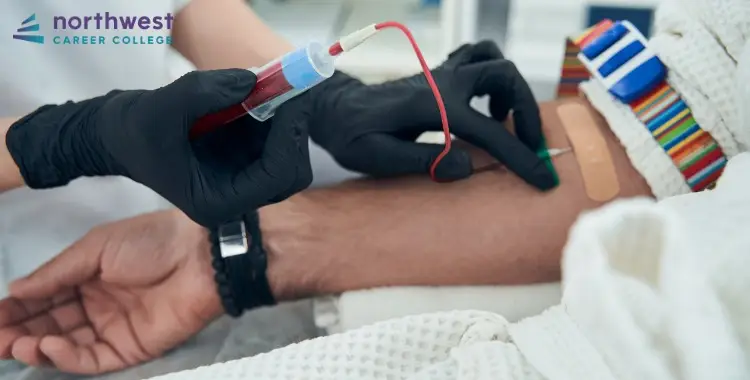7 Common Blood Clot Myths And Why They’re Wrong
- Phlebotomy Technician
- March 11, 2024
- 2.5k views
- 4 min read

Blood clots are underdiagnosed medical issues that claim the lives of 300,000 people every year. When a clot restricts the movement of blood, the health consequences for the victim can be severe and the worst part is that the majority of embolisms are entirely preventable.
One of the reasons behind the underdiagnoses of blood clots is that there is a lot of misinformation floating around out there about them. In this article, we’ll be clearing up seven of the most common blood clot myths.
Table of Contents
- Blood clots only happen to older patients and those with poor health
- DVT Isn’t a Serious Condition
- DVT Is a Rare Conditon
- Blood Clots Most Often Occur at Home or During Travel
- I Am in Great Shape, So I Don’t Need to Worry About DVT
- Birth Control Pills Will Give Me DVT
- Women Are at Greater Risk of DVT
- Start Your New Career Today
Blood clots only happen to older patients and those with poor health
This is entirely untrue. The sad fact is that everyone is at risk of embolism. Even if you live an active lifestyle and are still in your physical prime, you are at risk of getting an embolism. older patients and those with poor health simply have a higher risk.
DVT Isn’t a Serious Condition
Deep-vein thrombosis (DVT) is a dangerous medical condition resulting from a blood clot that forms in a vein. These blood clots often originate in the legs and can be painful and inconvenient, if not usually fatal. However, when an embolism breaks apart and moves from the legs to the lungs resulting in a pulmonary embolism can be potentially fatal.
Travelers who regularly make long journeys on cramped airplanes can be at a higher risk of blood clots than those who don’t. If caught early, doctors can treat them using blood thinners and most patients recover fully.
DVT Is a Rare Conditon
Actually, around 900,000 people are affected by DVT or pulmonary embolism every year in the United States, and up to 100,000 of them die because of it. DVT can is a danger to everyone and, if left untreated, it can cause serious illness, disability, and even death.
Certain groups, such as those having major surgery, those with cancer or heart or lung disease, those on birth control pills, and those with a family history of blood clots, are at a higher risk of developing DVT.
Blood Clots Most Often Occur at Home or During Travel
Strangely, most people seem to believe that blood clots most often occur at home or while traveling. While regular travelers in cramped conditions are at a higher risk, blood clots occur more often in hospitals than anywhere else.
I Am in Great Shape, So I Don’t Need to Worry About DVT
Being in great physical health is a great way to lower your chances of getting DVT, but it doesn’t make you immune to it. Athletes are actually at increased risk of DVT because they often suffer from physical injuries, dehydration, and end up traveling long distances for events.
Birth Control Pills Will Give Me DVT
The increase in estrogen caused by contraceptives does increase the risk of blood clots, but most women on birth control don’t have any complications. There are other groups, such as Obese women, those who are older than 40, and those who smoke, who are actually at a higher risk of developing clots.
Women Are at Greater Risk of DVT
Because of the increased risk of DVT associated with birth control and pregnancy, it is a common assumption that women have an increased risk of blood clots. However, it is actually men who have a statistically greater occurrence of DVT and pulmonary embolisms.
Start Your New Career Today
At Northwest Career College, we pride ourselves on providing one of the premier Phlebotomy Schools in Las Vegas.
Our established and seasoned instructors will take you through every aspect of Phlebotomy and Northwest offers day, afternoon, and night classes to accommodate your busy Las Vegas work and family schedule. Call us today at (702) 403-1592 to speak to one of our admissions specialists about your new Phlebotomy career.




